Best Antarctica Packing List and Winter Travel Packing List
I have traveled to cold and cold/wet climates many times. We went to Tromso and the Snow Hotel above the Arctic Circle in Norway. We went to the Alaska Wilderness and Iceland. Sometimes, we had the right gear. More often than not, we were missing something or were not quite as warm or dry as we wanted to be. When we went to see the Northern Lights, we were cold! When I decided to go to Antarctica, I was determined to get it 100% right. We developed this Antarctica Packing List and Winter Travel Packing list to make it easier for you.
Travelforlifenow is a participant in the Amazon Services LLC Associates Program. This means that we may earn a small commission on purchases that you make from links on our site. This does not affect the cost of your purchase.
Packing for Antarctica Travel
Being in the Water with Penguins, Whales and Seals was unforgettable. About a month before the trip, I began check the Antarctica weather and to think about all the Antarctica gear that I would need.
I started looking at my winter travel packing list from Norway and Alaska.
Then, I read about the weight limits for the charter flight from Buenos Aires to Ushuaia: 20 Kg for checked luggage and 5 Kg for carry ons. My camera gear alone weighed 5 kg.
I was worried.
How Cold is Antarctica?
The coldest recorded temperature in the Antarctic is -83°C (minus 128°F). Fortunately, the travel season for Antarctica is in summertime from November to March. The best weather tends to be in December and January. When I was there it was mainly in the 0°C range. With the wind a bit colder. Weather in Antarctica is very variable so you need to be prepared for cold, wind and snow. Plus, you’ll be on a zodiac and likely feeling the water.
What Makes an Antarctica Packing List Challenging?
When we went to Norway in the winter, we knew that it would be cold. Any precipitation would be snow. And, that we would be on land the entire time. Most importantly, we had no weight limit for our luggage. We created the winter travel packing list and kept it.
In Antarctica, you need to be prepared for cold, wet and windy. You also need to be prepared for the Drake Passage when you would be on the boat for 2 days up and back. On top of that, you might have multiple cameras. I had a DSLR, tripod, iPhone, underwater camera (for kayaking) and a GoPro. That’s a lot of gear for a 25Kg total. And, don’t forget your bathing suit for the polar plunge.
Winter Travel Packing List-Photography Essentials
I created a list of the most essential photography gear for Antarctic. I’ll start with cameras. I brought my Nikon 3100 DSLR with a 18-300MM lens. That was a good combination. Many others had DSLR (Canon seemed to be the most frequent) and point and shoots, iPhones and everything in between. Whatever you bring, you should be very familiar with how to operate. It’s hard to be figuring out while you see a whale or penguin.
The Waterproof camera that I brought was incredibly useful for the trip, especially during kayaking. I didn’t want to have to worry about ruining my expensive DSLR and I wanted to get good pictures. I’ve had a Lumix underwater camera for many years and it has served me well. I got a lot of great pictures. I even held it underwater and took a picture of the underside of an iceberg.

As far as DLSRs, I am a Nikon user and the D3100 is an older model. Here’s a link to the D3400 and the 18-300MM lense that I use. We recently switched to a mirrorless DLSR and you can read about that as well.



One of the best purchases that I made was a Waterproof case for my iPhone. It enabled me to take photos and videos while in the Kayak and on the zodiacs. In fact, almost everyone on the kayaks had the Vanksy Floatable Waterproof phone case. I still use it now when kayaking.
I brought my GoPro on the trip. I did not use it as much as I thought I would. The batteries did not last long in the cold and it was difficult to change the batteries while in the kayak. One of my kayaking colleagues did use his quite a bit. You need to be very adept with the GoPro before going to Antarctica, so I’d advise a lot of practice if you’re not already an expert user.
Floating Devices and SD Cards
In preparation for Antarctica, I brought a Waterproof float for my camera. With the float attached, I did not have to worry about dropping my camera in the water. If that happened, it floated back up again! This is something that I use all the time now. I also have a version of this for my glasses so I don’t have to worry about losing them in the water either.

I took thousands of pictures in Antarctica and I used a lot of SD cards. Many people buy 1-2 large cards. I prefer to buy several smaller 16G cards and I change them periodically. That way, if a card gets corrupted or damaged or lost, I only lose some of my pictures–not all of them.

Since you’ll be carrying a bunch of SD cards, spend a few bucks to buy card holders. They really do store the cards safely. I ordered 20 pack of Memory Card Plastic Storage Cases so I always have some handy.
Last but not least, cold temperatures will drain your camera batteries very quickly. Make sure you pack spare batteries and chargers for your cameras.
More Antarctica Gear
Did I mention that it was wet, and windy and cold? You’ll want to keep your DSLR dry and protected. A rainsleeve for your camera is an economical way to do so.
And, your hands will get very cold while taking pictures. If you have a tripod, a remote shutter release for your camera will be very useful. You can read about how we used our tripod and remote on our trip to Norway to get pictures of the Northern Lights. Remote shutter releases are brand specific, make sure you research and test them out before leaving for your trip! I have a Nikon 3100 and did a lot of research to find a remote for my camera. The 3100s don’t have an infrared sensor so most remotes do not work with the 3100s. This is the remote that I found. It works with any camera that has a hot shoe.
Important: Make sure to get the right one that is made for your camera.

Winter Travel Packing List-Dry and Compression Bags
I also needed a backpack carry on for the plane that was lightweight (remember the weight limit–I didn’t want to waste any space with a heavy backpack). It had to be large enough to hold all my camera gear and electronics along with passport and other travel papers. It also had to do double duty as my dry bag. In Antarctica, when I was not on a kayak, I was on a zodiac. In either case, I had to protect my camera from the water.
Note: This is water resistant, not waterproof.

I am a big fan of compression packing cubes. They are lightweight and compress your clothes without wrinkling them. They also make unpacking easy. I travel. Just take them out of your bag and put them in a drawer. You are done. My favorite are the Gonex cubes and I use them every time them Be careful with the zippers as they can catch when the bags are not full.

We also use an Ultralight Compression Bag for things we don’t care about being wrinkled. It doubles as our laundry bag on the way back. We pull the straps as tight as possible for full compression. It’s also easy to loosen once you get familiar with it.
Antarctica Packing List-Clothes
In addition to the camera gear, I needed the right clothing for the trip. The good news is that I didn’t need to bring a parka–the cruise provided that. They also provided rubber boots for the zodiacs and a dry suit with booties and rubber boots for the kayaking.
What did I have to bring? Base layers, waterproof pants, gloves and hats.
Antarctica Gear – Hands
Let’s start with hands. I brought two pairs of gloves–the Swany Artic Mittens for when I was on land and neoprene fisherman’s gloves for kayaking.
I loved the Swany mittens. They kept my hand warm. These gloves have a zipper that allowed me to keep them on while I took photos. I simply unzipped, slide out two fingers to snap. The gloves have an inner liner so my hands were still covered when I unzipped. And, I did not have to worry about dropping gloves and taking them on an off while I was trying to take the perfect picture of a penguin.
You’ll want to have a second pair of gloves in case one pair gets wet or lost. The alternative to a mitten is glove liners. With glove liners, you take off the outer glove and leave on the liner to take pictures. We did this on our Northern Lights Tour and still use them in the winter. I prefer the mittens.
For kayaking, I brought Glacier Glove Fishing neoprene gloves. These were great BUT they are not waterproof. The kayaking team had a very inexpensive solution that worked very well. They gave us dishwashing gloves to wear over whatever gloves we had brought. While it did not look sleek, the combination of the neoprene and dishwashing gloves was very effective. Keep in mind that you will need dishwashing gloves that are large enough to slide over the gloves.
Antarctica Packing List–Pants and Base Layers
Most of the tour operators require that Antarctica travelers have waterproof pants. In fact, one of the people on my tour was refused entry to the zodiac because she did not have a pair. She had to buy a pair on the boat (much more expensive).
I have had Helly Hansen rain pants for many years. They are great. Lightweight (remember the weight limit for bags) and waterproof. You’ll want to size up because you’ll have several base layers underneath.
I thought about bringing snow pants along as well. I left them home and I was glad that I did. You really won’t need them as long as you have enough base layers and good rain pants. Snow pants are heavy and take up too much space.
A good base layer is very important. You don’t want to be sweating underneath your layers during the land excursions and kayaking. Unfortunately, I am allergic to wool so I cannot wear any of the smart wool products. Instead, I wear EMS Techwick base layers. They are very comfortable. I wear them in the winter and they were great in Antarctica. You’ll want to nuy either medium or heavyweight.
In Antarctica, I wore 2-3 additional layers underneath my dry suit (kayaking) or my waterproof pants. Some of my fellow passengers wore as many as 6 layers. The additional layers were mid- and lightweight. You’ll want to be able to mix and match based on the temperature.
Our Antarctic Travel Guide: 10 Things I Wish I Knew Before I Went will give you many more tips about going to Antarctica.
Going to a Cold Destination? Been to Antarctica? What’s the Best Thing you Brought?
Please Pin and Share.
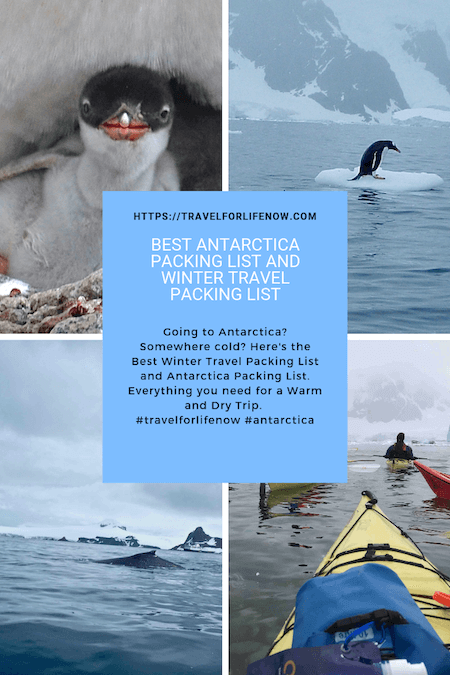

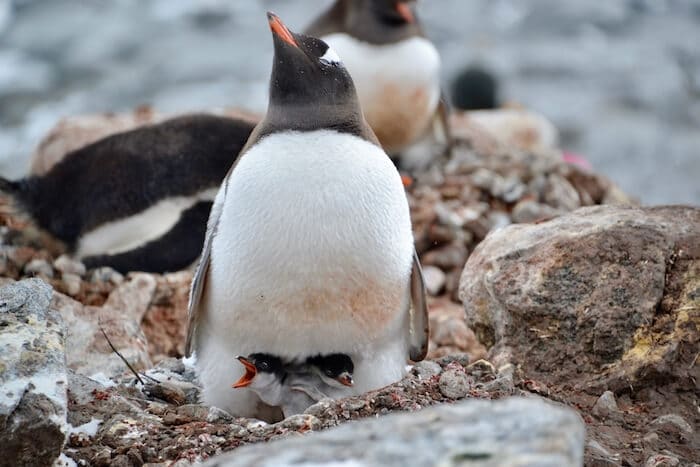
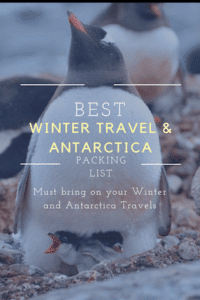
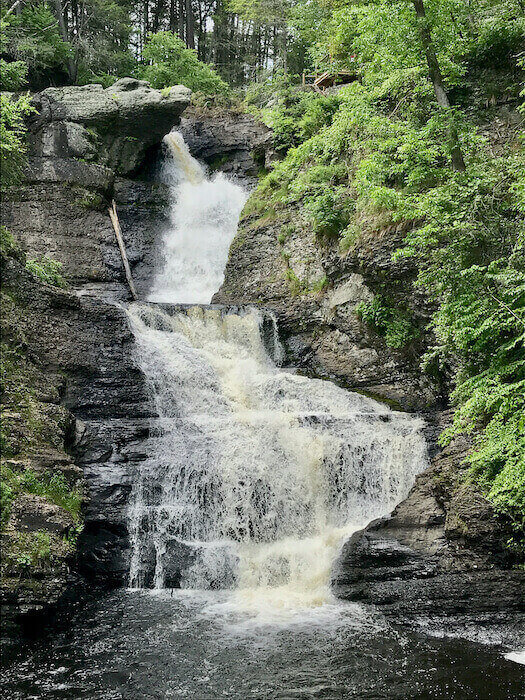
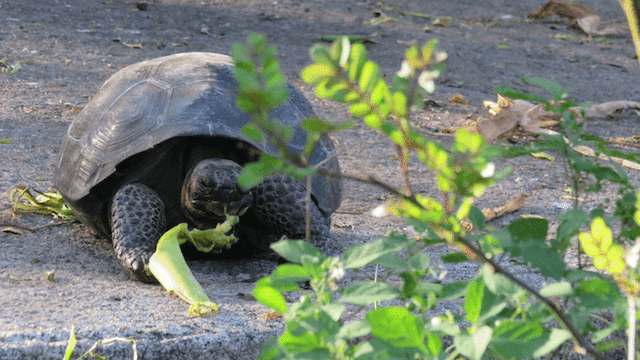
I really need to invest in a waterproof phone pouch already for travels! That’s an item to bring for any packing list, whether your destination is cold or hot!
Yes. I use it all the time now
I dread winter weather but Antartica is definitely on my bucketlist…places to visit atleast once in a lifetime
Thanks for also sharing such a detailed packing list. A compression packing cubes is something I definitely need in my life. Makes life easier.
Lora By Lora
I don’t like winter either but Antarctica was worth it
I am also a huge fan of packing cubes, they make living out of a suitcase or backpack SO much easier! They’re great for keeping things organised. I’d never heard of a waterproof float for your camera – what a great idea! I’ll have to keep some of these in mind, not just for Antarctica but anywhere requiring similar gear. Thanks for sharing!
Thanks. I mostly listed the things that I still use
Wow your backs look really packed! Antartica seems like a really difficult place to pack for. I would have no idea what I would pack so thanks for this list! Antartica is on my bucket list for sure! What was your favorite part?
Kayaking in the water with penguins and whales
Oh my this makes me want to put Antarctica on my bucket list! Wow!! Penguins!!!!
Definitely worth going
Omgd I never would have thought of a bathing suit for the “polar plunge” in Antarctica! Great tips for protecting electronics from the weather. I don’t plan to visit Antarctica anytime soon but that same gear would be useful for rainy hikes and treks.
Thanks for comments. Yes the polar plunge is quite an experience
This is such a useful post! If I ever make it to Antarctica (which I hope I do!), I’ll definitely refer back to this!
Thanks. Hope you make it wthere
I still cannot believe that travel to Antarctica has become a thing. At first, I was so skeptical but now, I kinds also want t go 🙂
It must be a very special trip, so you need a preparation for a cold/wet climate. Thank you for your tips!
Thanks for reading and commenting
Love the packing cubes and compression sacks. Definitely depends on what kind of trip and what I’m packing. The cubes offer great organization for clothes hands down!
Nadia-Agreed about the packing cubes
Sue
There aren’t enough strong words to express how much I hate the cold weather, but man, OH MAN!, I want to see whales and penguins like this!!!
So want to make this trip someday! I’ve pinned this for that happy day!
wow I’d absolutely LOVE to go to Antarctica one day. Hopefully I’ll be able to put your packing guide to good use if I get to go!
This is fantastic! Antarctica is at the very top of my list! I could just sit and photograph wildlife all day! I didnt realize it gets up to 0 degrees! Being from Canada and used to -45 i think I could do it!
I’d love to know and not to be nosey but how much did you budget for this trip. I NEED to get there one day but also need to find an idea of the cost lol
thank you!
Lauren,
Antarctica is expensive, but there are some ways to cut costs. There are discounts for booking very early and very late. Some people book 2 years ahead and do a payment plan. I booked very late and had a 35% discount. There are also shared rooms (triples) that can cut your costs. If you book late, the airfare can be expensive, but sometimes the charter flight from Buenos Aires to Ushuaia is included. Some also include travel insurance (mandatory for this trip) and that can save you some money. I can tell you more if you email me via the contact form so we do this on email. Too much to put in the comment section.
Sue
This is super helpful! For some reason, packing for cold weather destinations is always a little difficult for me (even though I’m from a cold place!). And also, loved seeing some shots from Antartica!
Packing cubes are our fastest friends in our fulltime camper travels. Great post for icy adventures.
That’s an incredibly useful account of all the things to be considered when making this bucket list trip a reality. Even down to the float for the glasses, and the delicate weight balancing of camera gear and the right sort of clothing. It’s great to have this good understanding to counterbalance the excitement of my head babbling about penguins and underwater shots of glaciers. Still on the bucket list here, and your advice is much valued in anticipation of the time I make it happen.
Bernadette,
Glad this was helpful. I spent a lot of time thinking and planning before the trip. It was an amazing experience and I hope that you get to go.
Sue
Wow, what an interesting read, honestly. Traveling to Antarctica seems almost otherworldly. Thanks for sharing all of this advice. Super useful!
Love this post! I’m hoping to make it to Antarctica in the future. In the meantime, I have an upcoming Alaska adventure cruise I’m preparing for, and a lot of these tips are also super helpful for that (although it won’t be quite as cold!) Those waterproof camera floats you show are a great idea. Definitely getting one! Thanks for the great tips 😀
Carrie Ann,
Thanks and I hope that you get to Antarctica. Alaska’s fantastic too! And the camera and eyeglass floats saved me a lot of worrying.
Sue
This was an amazing blog to read, Antarctica is the coolest place in the world and it is my dream to go there.
Thanks for this great packing list. Keep up the good work, Cheers!!
Thank you for sharing such an informative blog.
Nice content on how to travel in winter. So I used to travel only International trips. Also the company called pickyourtrail helps me with the itineraries and attractions as well. So anybody wants a trip to international please reach them out for outstanding support. BTW nice package list thou
Loved reading your blog! Would love to go to Antarctica one day, it looks so beautiful!